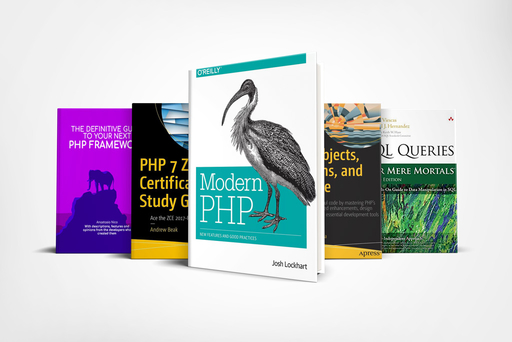Is it difficult to learn PHP? (2023 update)
Coding (PHP 8)
Uncover the truth about PHP coding and its learning curve. Unleash your potential and dive into the world of web development.

It's 2003,
I found myself in a library, holding my first programming book on the basics of C++.
Little did I know that this moment would mark the beginning of an exhilarating journey into the world of coding.
Over the years, I've witnessed many people start and abandon coding, much like Jiu-Jitsu practitioners testing the waters on the mat.
Let's face it; coding is not a walk in the park.
It demands dedication, consistency, and it might not offer the immediate dopamine rush other activities do.
So, is learning PHP or coding in general difficult?
The short answer is YES. But here's the catch: if you learn to love it, coding can become one of the most fulfilling and rewarding pursuits you'll ever experience.
In this blog post, we'll delve into the realm of PHP, exploring its concepts and why you should give it a shot.
You'll discover all the possibilities and creativity that will ignite your passion for coding.
Dispelling the Myths
Let's start by eliminating the many misconceptions surrounding the perceived difficulty of learning PHP, but let's set the record straight.
PHP is, in fact, a beginner-friendly language that can be easily grasped with the right approach.
One common myth is that PHP lacks structure and is messy to work with.
While PHP allows flexibility, it doesn't mean it's disorganized.
With proper coding practices, such as following coding standards and utilizing frameworks like Laravel or Symfony, PHP projects can be well-structured and maintainable.
Another misconception is that PHP is outdated or irrelevant.
However, PHP continues to evolve and improve with each new version.
It powers a significant portion of the web and is used by popular platforms like WordPress and Magento.
Its extensive community support ensures that learning resources and tutorials are readily available.
Like any programming language, PHP requires practice and dedication.
Learning PHP involves understanding core concepts like variables, functions, loops, and conditional statements.
By working on hands-on projects and practicing regularly, you can strengthen your skills and become proficient in PHP.
Remember, learning PHP is not a one-time effort.
It's an ongoing journey of continuous improvement.
Embrace coding challenges, join PHP communities, and participate in open-source projects to deepen your knowledge and enhance your coding skills.
Beginner-Friendly Features of PHP
PHP has gained its reputation as a beginner-friendly language due to several features that make it easy to learn and work with.
One of the standout qualities of PHP is its simplicity and readability.
The syntax is designed to be straightforward and intuitive, making it easier for beginners to understand and write code.
With its C-like syntax, PHP offers a gentle learning curve, allowing newcomers to quickly grasp the basics.
Another advantage of learning PHP is the abundance of learning resources and documentation available.
From online tutorials to comprehensive documentation, aspiring PHP developers have a wealth of information at their fingertips.
This vast array of resources makes it convenient to find answers to questions and learn at your own pace.
PHP's strong community support is also worth mentioning.
The PHP community is known for its active and helpful members who are always willing to assist newcomers.
Blogs, Online forums, discussion boards, and community-driven websites provide a platform for sharing knowledge and seeking guidance.
Engaging with the community not only helps you find solutions to your challenges but also fosters connections with like-minded individuals.
Moreover, PHP has an active developer community that continuously contributes to the language's growth and improvement.
With regular updates and new features being introduced, PHP remains relevant and up-to-date in the ever-changing landscape of web development.
So, if you're a beginner looking to dive into programming, PHP offers a friendly environment to start your journey.
Its simplicity, readability, abundance of learning resources, and strong community support make it an ideal choice for aspiring developers.
Photo by Sigmund on Unsplash
Learning PHP Step-by-Step
Advice numero uno is to start learning PHP step-by-step.
It is essential for building a strong foundation in this versatile programming language.
To begin your journey, it's important to set up a development environment that suits your needs.
This allows you to practice and experiment with PHP code in a controlled and efficient manner.
Once your environment is ready, it's time to dive into the basic concepts and fundamentals of PHP.
Understanding variables, data types, operators, control structures, and functions will provide you with the building blocks to write PHP code effectively.
Taking the time to grasp these core concepts will help you navigate more complex topics later on.
To reinforce your understanding, practical examples and exercises are invaluable.
Hands-on learning allows you to apply the concepts you've learned in real-life scenarios.
By working through coding exercises and projects, you gain practical experience and develop problem-solving skills specific to PHP.
Additionally, learning from real-world projects and open-source code can be tremendously beneficial.
Studying well-structured projects helps you grasp best practices, coding standards, and common design patterns.
Open-source code exposes you to different approaches and techniques used by experienced developers, allowing you to learn from their expertise.
Remember, learning PHP step-by-step is a gradual process.
Take your time to absorb each concept and practice regularly.
Building a solid foundation will enable you to tackle more complex projects and continue advancing your PHP skills.
Benefits of Learning PHP
My journey in programming began as a teenager, dabbling with C++, Java, and Assembly, and I have to admit, as I wrote in a few previous blog posts I didn't quite enjoy it back then.
However, everything changed when I discovered web development.
The world of coding opened up to me, and I fell in love with it all over again.
PHP, being at the heart of web development, played a crucial role in reigniting my passion.
Learning PHP opens up a wide range of career opportunities and job prospects.
Web development, e-commerce, content management systems (CMS), and application development are just some of the areas where PHP skills are highly sought after.
As businesses and organizations continue to embrace the digital world, the demand for skilled PHP developers remains strong.
One of the biggest bonuses of learning PHP is its versatility and flexibility in web development. PHP can be used to build simple static websites, dynamic web applications, or even large-scale enterprise systems.
Its ease of use and extensive libraries make it an excellent choice for rapid development, while its robustness and scalability allow it to handle complex projects with ease.
PHP's seamless integration with popular databases, such as MySQL, PostgreSQL, and MongoDB, makes it a powerful tool for managing data in web applications.
Additionally, its compatibility with widely used CMS platforms like WordPress, Drupal, and Joomla makes it an ideal choice for building and customizing websites.
The PHP ecosystem is continually evolving and growing.
The community-driven nature of PHP means that it's always adapting to the latest trends and best practices in web development.
With regular updates and new features being added, learning PHP ensures you stay up-to-date with the latest technologies and advancements in the industry.
In conclusion, learning PHP can be a transformative experience, offering a plethora of career opportunities, a versatile toolkit for web development, and seamless integration with databases and CMS platforms.
Conclusion
In this quick blog post, we've explored the world of PHP, debunking misconceptions, highlighting its beginner-friendly features, and emphasizing the importance of learning one step at a time.
This is the most important thing for not burning out straight away.
I shared my journey, from initially being hesitant about PHP to rediscovering my love for coding through web development.
Learning PHP may seem daunting at first, but it's a rewarding journey that opens up a world of possibilities.
Try to embrace the challenges, practice consistently, and you'll soon find yourself creating web applications and websites with ease.
Remember, PHP's simplicity, readability, and vast community support make it accessible to beginners and seasoned developers alike.
Don't be discouraged by initial hurdles; with dedication and practice, you'll master PHP and use it to build powerful and dynamic web solutions.
As you continue your PHP learning journey, don't forget to explore additional resources, tutorials, and real-world projects.
There's a wealth of PHP-related content out there that can enhance your skills and knowledge.
Stay tuned for more blog posts on PHP and web development.
If you want to know more about PHP and web development in general subscribe to my newsletter.
In there, I'll be sharing more insights, tips, and tricks to help you become a proficient PHP developer.

